http://www.bbc.co.uk/news/uk-15568442
This link takes you to a bbc news articles saying “many adults think children are ‘feral’, survey finds
This survey was undertaken by Barnardos and talks about the view society has on children today interesting and frightening that nearly 50% of adults think children are starting to behave like animals.
Saturday 19 November 2011
Tuesday 15 November 2011
Derren Brown
http://www.channel4.com/programmes/derren-brown-the-experiments/4od#3252139
Just watched this and wow, really amazing and freaky at the same time. How scary to think you can be conditioned to believe that you have committed a murder.
Just watched this and wow, really amazing and freaky at the same time. How scary to think you can be conditioned to believe that you have committed a murder.
CLASSICAL CONDITIONING
It was Russian physiologist Ivan Pavlov that discovered he could condition the dogs used in his research to salivate at the sound of a bell rather than the presence of the food they awaited. This conditional response also works in humans.
One of the most controversial experiments in conditioning is known as Little Albert and was conducted in 1920 by American psychologist John B. Watson. Albert, a pseudonym, was just nine-months old when the experiments began. They involved a white rat which Little Albert was happy to play with when it was first introduced. Albert had no instinctive fear of the rat. Later Watson would make a loud clanging noise by striking an iron bar with a hammer whenever the rat appeared. The sound, not the rat, distressed the child. Within two weeks just the sight of the rat would have Little Albert crying. Watson's study was part of his belief that our behaviour is shaped by our environment and not handed down by genetics.
This programme shows us how nurture can play a part. In the first part of the programme Derren used touch and sound to condition the feeling of guilt so when Jody was touched on the shoulder or he heard a bell ring he had the feeling of guilt. In the next part Derren worked on doubt, so putting doubt in Jodys mind by people changing what they were wearing, moving furniture around, this made Jody question himself and think about what he thought he had seen. This programme is definitely worth watching.
Saturday 12 November 2011
Television and Radio w.c 14.11.11
http://www.channel4.com/programmes/unreported-world
Friday 18th November 7.30pm
Examining claims that thousands of Indian children are being sold into domestic slavery.
http://www.channel4.com/programmes/my-transsexual-summer
Tuesday 15th November 10pm
http://www.radiotimes.com/episode/nqvkz/fairground-attractions--fairground-attractions
Thursday 17th November 8pm
Friday 18th November 7.30pm
Examining claims that thousands of Indian children are being sold into domestic slavery.
http://www.channel4.com/programmes/my-transsexual-summer
Tuesday 15th November 10pm
http://www.radiotimes.com/episode/nqvkz/fairground-attractions--fairground-attractions
Thursday 17th November 8pm
ABOUT THIS PROGRAMME
1/6. New series. The world of travelling fairs, meeting some of the families who have been in the business for generations. Anna Carter and her sons, of Carters Victorian Steam Fair, receive a royal visitor when they roll up in Wiltshire, and Henry Danter, owner of Treasure Island funfair, introduces viewers to his heirs - children Kimberley and Harry. Third family the Couplands are gearing up for the grand opening of Mitcham Fair in London. But with preparations well under way, they hear widespread rioting and looting have broken out in the capital, meaning the event may have to be cancelled.
These are radio 4 programmes
Thursday 10 November 2011
Gender
My Transsexual Summer: a new view of gender
Channel 4 reality doc My Transsexual Summer explores what it's like to change gender. Forget all the 'brave' cliches. This TV series is about happy, healthy people
- Paris Lees
- guardian.co.uk,
- Article history
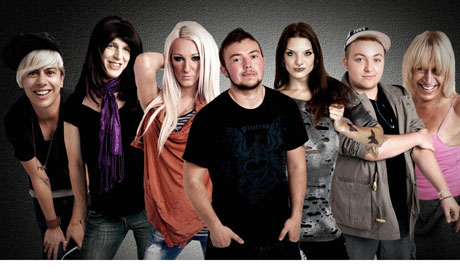
The participants of My Transsexual Summer.
Fancy getting sozzled tonight? Try the Trans Documentary Drinking Game, something of a transgender community in-joke. The rules are simple: for every cliche, take one shot of tequila. US writer Helen Boyd, author of My Husband Betty, lists 35 classic clangers, including: trans woman putting on makeup (two shots for reverse camera shot into mirror); showing "before" photos; any reference to genital surgery that includes "finally becoming a woman"; and anything with a trans woman sitting in an above-the-knee skirt, "posed so you can see what great gams she has". Camera in the operating room? Down the whole bottle.
All these silly tropes appear in the first episode of My Transsexual Summer, Channel 4's new primetime reality doc. Yet MTS does have something original to offer: it gives trans people – at least seven – a voice. Yes, we see someone's willy surgically vajazzled into a fancy new foof, but it's deeper than that. The show, I mean. Rather ironically, we also hear participants complain that non-trans people often reduce them to their naughty bits. Max – one of the "Magic Tranny Seven", as the group dub themselves – points out: "If you're out, and trans, it almost gives people licence to ask you whatever they want … How would you feel if I met your mum and said: 'How's your junk?'" It's sensational meets substance.
For the past eight months, I've been consulting on this show, a mixture of upmarket Big Brother "retreat" and observational footage of seven diverse personalities. It's also the first major piece of trans-themed output since Channel 4 signed a Memorandum of Understanding with my campaign group, Trans Media Watch. The document suggests treating trans people with accuracy, dignity and respect. Pretty radical, huh? Apparently, I've been "a pain in the arse" to work with. Good. I'd be astonished if a team of all-white film-makers, runners, producers and researchers felt they had a God-given right to make TV about ethnic minority issues. Nothing about us without us, as they say.
Can you blame me? My boyfriend lost his mum this year and, while mourning, we visited his dad who, to lighten the mood, popped the telly on. When his dad's girlfriend flicked over to the comedy channel, I knew it was only a matter of time before something offensive about trans people was said. It took 10 minutes. On this particular occasion, it was Lee Mack in Not Going Out. Lee's character joked that he'd like to see pal Lucy recreate Sharon Stone's infamous leg-crossing scene from Basic Instinct. He then tries to persuade Lucy that her new partner is a mobster:
Lucy: Yeah Lee, he's a gangster and I'm a post-op transsexual.
Lee: Maybe forget doing the Sharon Stone thing then.
Perhaps everyone else felt embarrassed, but I was angry, and reminded why I haven't owned a television since 2007. But why does it matter how trans people are represented?
Growing up, the only time I'd ever seen trans people on TV were those "brave", depressing ones, hanging around hospitals waiting for "sex change" surgery. They may as well have been aliens. The ex-mining town where I grew up in Nottinghamshire was insular to say the least. Changing gender was something that simply didn't happen to the people on my council estate. But I knew from four that I was "different", and other people seemed to notice too. I was routinely bullied, often quite violently, for years.
Puberty was a real drag. I hated the way my body was changing; no one told me I had a medical condition, that help was available. I was confused and angry. I mixed with the wrong people and went to the wrong places: anything negative I welcomed, and I was deeply unhappy.
Seven years ago, I was sent to borstal. Slithering around in the societal sludge, I was forced to admit I'd made a huge mistake – committing robbery. The thought of transitioning to female, let alone getting a degree, or career, felt insurmountable. Then came Nadia Almada. After her Big Brother stint, and for the first time in my life, changing gender didn't seem so extreme. I could still have friends. I could go to college, to bars – to Sainsbury's. Nadia's success suggested I could remain a valid – Nectar card-carrying – human.
Such is the power of representation. A close friend also transitioned off the back of Nadia's win and, I expect, so did others. We would probably have done it anyway – or killed ourselves first – but how many more years of self-destruction did we avoid? My Transsexual Summer's Sarah recalls watching trans people on late-night TV: "I remember being really choked; because someone else felt the same as I did."
Then there's the internet. Fox, one of the participants, says he wants to give back after finding support through online transition diaries: "Life's about doing stuff that scares you, and taking part in this really scared me. Before I transitioned, I was so lucky to have YouTube … I'd just watch video after video, as I was hungry just to see people who were in some way like me."
It was refreshing also to see Fox and his new pals pooh-pooh the notion that one can never truly flourish in a new gender presentation. Where else can we see happy, healthy, bright young trans people on TV? "Each of us brings a completely different viewpoint," says Lewis. "It's always been done in a really miserable way in the past, but this is fresh and new. If anyone's considering transition themselves, it shows that there's light at the end of the tunnel."
Love or loathe her – and you'll have a response either way – Donna delivers an unapologetic perspective: "I wanted to put a different spin on things, as a lot of trans people have a lot of grief in their life. But it's been quite easy for me and I can hold my hands up and say, yeah, I'm having a good time." And Sarah doesn't want your pity either: "Don't feel sorry for me because I'm trans – buy me a drink. I've made the best decision ever."
I'm sceptical about shows that claim to solve complex socio-personal issues: some people need therapy, not Gok Wan pouring them into a corset. Yet I'm inclined to think MTS has made a real difference to some of its previously isolated and vulnerable subjects.
Lewis says he'd never knowingly met a trans person before, and that MTS genuinely helped him: "It was one of the best things I ever did, I feel so much more confident. My friends are absolutely great, but they don't quite understand, because they've not been through it themselves."
Perhaps now we'll all understand that little bit better.
My Transsexual Summer is on Channel 4 at 10pm on Tuesday
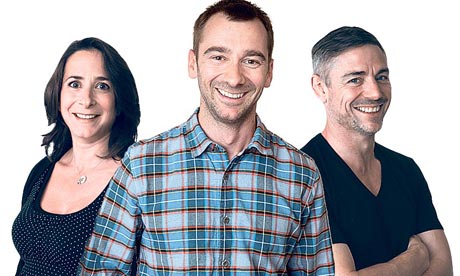
My Transsexual Summer is on Channel 4 at 10pm on Tuesday
Charlie Condou: The three of us
Two dads, one mum – one family

Catherine, Charlie Condou and Cameron. Photograph: Graham Turner for the Guardian
Co-parenting – it shouldn't be that hard to understand and yet many people seem to struggle with the idea. Gay parenting in the public mind comes in two flavours – sperm donation and surrogacy. But that's not how it is for us. My child has a mummy and two daddies and while we don't all live together in some sort of quirky, sitcom writer's dream, we are friends who hang out together, holiday together and, like any family, occasionally bicker.
Not over the big things; we sorted them out before we ever set foot in an IVF clinic. On general parenting principles, responsibilities, education and the rest, we are as one. But sometimes we are three adults with three opinions and one bemused child in the middle. We agreed, early on, that in situations where we disagreed, any one of us would have the power of veto. We wanted to avoid situations where it was two against one, so any one of us gets to pull the plug on an idea or strategy.
This leads to some interesting Mexican standoffs. Like when we were in Canada last year, when Georgia was just a few months old. We were still pretty new to parenting and this was the first time we'd travelled long distance with her (to introduce her to her third set of grandparents, Cameron's family). Finding ourselves in the middle of the Canadian night with a fractious baby, we could not agree on the reasons for her inability to settle. Catherine thought she was tired, and needed to sleep. I thought the opposite, that she was jet-lagged, out-of-sync and wanted to play. Cam thought that she was just hungry.
After 10 minutes of frustrated rocking/pacing/sniping at each other (we were jet-lagged too, and four of us sharing a room didn't exactly help with the general mood), Cam took control and fed the baby, to a chorus of "We'll never get her routine straight now" from her other two parents. Naturally, Georgia was snoring peacefully in her basket 10 minutes later, leaving Catherine and me to seethe silently while Cam bathed in a pool of smug.
The issues concerning three-way debating are never more acute than when we're picking a name. We're dealing with this at the moment as our baby boy is due in January. The problem is that we all have very different taste in names. I like old-fashioned, working-class English names, Cam goes for rough-and-tumble Americana and Catherine wants something more sophisticated. It is impossible to find a name that makes everyone happy. If you draw a Venn diagram of our likes, there is no overlapping section where our differing tastes miraculously meet. We do all agree, however, that we don't want anything ostentatiously quirky.
There will be no Eagle Flame Condou running around. Actually, it's fairly easy to come up with a list of names we won't use, as a seemingly endless succession of suggestions is greeted with a chorus of "Noooo!" from the other two. A couple of weeks back, it really felt as though we'd reached a stalemate. So, we've decided that we will each contribute six names to a shortlist. Then each person gets to cross two names off each list, leaving us with a shortlist of six to choose from. Hopefully, we'll be able to reach a consensus from there.
I am less dogmatic than the other two as I get the surname (Georgia and the new baby are both Condou), but it'll still be a miracle if he's anything other than "baby" by January. Perhaps we should just toss a coin for it.
Follow Charlie Condou on Twitter @charliecondou
Neet
Towns where 1 in 4 young people are 'Neets' revealed
Doncaster, Grimsby and Warrington named in first study to map clusters of under-25s who are not in work, education or training
- Jessica Shepherd, education correspondent
- guardian.co.uk,
- Article history
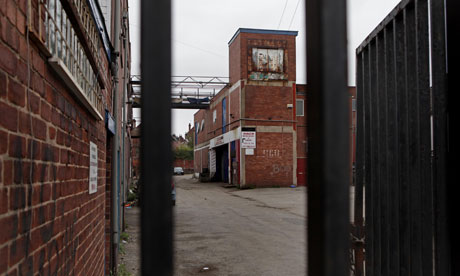
Industrial buildings in Doncaster. Researchers found that neet blackspots tended to be in areas with a history of industrial decline. Photograph: Gabriel Szabo/Guzelian
Nearly a quarter of 16- to 24-year-olds are not in work, education or training (Neets) in some English towns – and this is likely to rise in the next few years.
In Grimsby, Doncaster and Warrington, almost one in four under-25s are Neets, says a joint report by the Work Foundation, a job market thinktank, and the Private Equity Foundation charity.
In some cities, such as Oxford, Aberdeen and York, the proportion of 16- to 24-year-old Neets is fewer than one in 10 – far below the national average of 15.6%.
The study is the first to map the towns and cities in England, Scotland and Wales where clusters of Neets aged under 25 are located. The researchers focused on 53 towns and cities. They found that Neet blackspots tended to be in the north of England, in areas with a history of industrial decline that were heavily reliant on public sector employment. Apart from Birmingham, these cities and towns were on the outskirts of major cities, had relatively low-skilled citizens and had struggled to attract private sector firms.
Academics warned that in some areas, there was beginning to be a "sense of no future" and that the coalition's cuts were "needlessly sacrificing" young people.
While in Grimsby, Doncaster and Warrington, one in four under-25s are Neets, in north-east London, a fifth are. In Blackpool, Rochdale, Oldham, Wirral and Ellesmere Port, almost a fifth of 16- to 24-year-olds can be classed as Neets. The same is true in Birmingham, Newcastle, Barnsley, Swansea and parts of east London. However, in Oxford, Aberdeen, Cambridge and Plymouth, fewer than one in 10 are Neets. On average, across England 15.6% of all 16- to 24-year-olds are Neets.
The latest figures show that the number of Neets in this age group hit a record year-on-year high at the end of last year in England: 938,000 young people under 25 were Neets, quarterly statistics from October to December last year show.
Child Protection
Newborn babies in peril of abuse or neglect by 'toxic trio' parents
One in four babies at risk of abuse by being born into homes beset by domestic violence, mental health or drug problems
- Randeep Ramesh, social affairs editor
- The Guardian,
- Article history
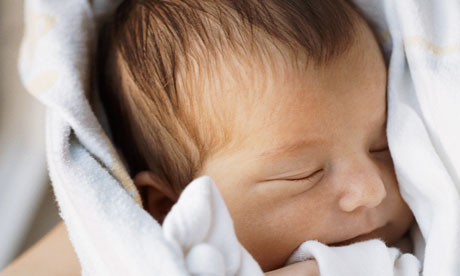
One in four babies is at risk of being killed or abused by being born into homes beset by domestic violence, mental health and dependency problems. Photograph: Lisa Spindler/Getty Images
At least one newborn baby in four is at high risk of death or abuse because one or both parents are beset by a "toxic trio" of domestic violence, mental health difficulties or substance dependency, according to the NSPCC, the only non-governmental body with statutory power to take children into care.
The charity calculates 198,000 babies in the UK are at high risk in a home beset by abuse, addictions and mental distress. The latter was by far the biggest risk, with 144,000 babies under a year old living with a parent with mental health issues. More than 93,000 babies have a problem drinker as one parent, while 50,000 are with one of their parents having used an "illegal drug" in the past year.
Though reasons for violence and abuse are complex, risk of homicide is greatest in a child's first three months. The NSPCC report, All Babies Count, says the perpetrators are "almost always parents".
The charity is starting an education drive aimed at reaching parents of 80,000 newborns over two years in 12 hospitals, using work in the US which cut hospital admissions by 40%. It is also testing an Australian model of teaching early parenting that cut risk of child harm for drug addicted parents.
A child's "frailty and total dependence" have to be taken into account when judging what constitutes neglect or violence, said the charity, but its analysis of 130 serious case reviews (investigating the death of a child) showed almost 75% had one or more of a "toxic trio" in a parent of mental illness, substance misuse, and domestic abuse as a significant factor. Maltreatment risk, especially neglect, is much higher in "trio" than in "normal" families"; the worst outcome is non-accidental head injury (NAHI), or "baby shaking syndrome", the most common cause of death or long term disability in such cases.
The report also says such conditions mean babies' life chances are worse for future learning, behaviour and health. In New Zealand a study found that, at age 15, a child with at least one problem-drinking parent was more likely to have "mood disorders, depression, anxiety, substance misuse and behaviour problems".
The government welcomed the campaign and its "innovative services". Iain Duncan Smith, work and pensions secretary, said: "At birth, 25% of a child's brain is formed, but already by the age of three, it is 80% formed. So intervening early to prevent harm is absolutely crucial."
Children in danger from violent fathers 'due to social services failures'
Almost 90% of men guilty of domestic violence remain in close contact with their children without supervision, report finds
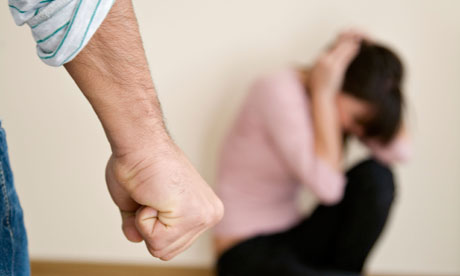
Working With Risky Fathers is first report into involvement of chidren's services with domestically abusive fathers. Photograph: Dani Rodriguez / Alamy/Alamy
Children are being exposed to extreme danger because social services are failing to prevent or monitor contact with their violent and abusive fathers.
Almost 90% of men guilty of multiple instances of domestic violenceremain in close contact with their children despite local authorities failing in the majority of cases to conduct sufficient assessment into the risk they represent.
Working with Risky Fathers, the first study into children's services involvement with domestically abusive fathers, looked mainly at men living outside the family home.
"Really scary, violent fathers are routinely falling through the gaps in children's services, putting children who have already been raised in homes where domestic violence was present, at risk of further physical and emotional harm," said Cathy Ashley, chief executive of the Family Rights Group (FRG).
Launched today by the FRG and the Parenting Fund, the report found that 88% of the men surveyed continued to have contact with their children despite often long histories of domestic violence.
But the report also found an overwhelming lack of detail in the assessments of the risk these men presented to their children. In 46% of cases, for example, the birth fathers' phone number was not on the files. In over 60% of cases, the survey found that the father's parenting capacity was simply 'not known'.
The report surveyed three local authorities' case files of perpetrators of domestic abuse over 11 years. The fathers were frequently guilty of more than six separate reported incidents of domestic violence. Many adult victims had been pregnant during at least one of the attacks.
"If you don't assess these men, you don't know which are the seriously dangerous ones who could harm their children if given access," said Ashley.
The report also found that of the minority of domestically abusive men who did have their parenting assessed, just 26% were offered a place on a domestic violence perpetrator programme.
"There are many reasons why these men are not being properly assessed or treated," said Ashley. "Not only are these scary men but children's social services employ a largely female workforce that hasn't been trained to deal with such intimidating situations. Added to which, there simply aren't enough domestic abuse perpetrator programmes to send them to."
Ippo Panteloudakis, a manager at Respect, the membership association for domestic violence perpetrator programmes, say there are around 35 such programmes in the UK. "Men commonly have to travel hundreds of miles to access help," he said. "What happens more often is that local authorities use inappropriate alternatives or, frequently, no alternatives at all."
Ashley said the report highlights the fact that the onus of child protectionsocial work continues to be on the mother to protect the child, even when she is a victim of domestic abuse.
The report, however, also found that non-resident fathers not guilty of domestic violence can find themselves ignored when they try to warn social services of risks, such as those presented by a mother's neglect or her new partner.
"Children's services are failing to engage with fathers who are the protective factor for children at risk," said Ashley. "We found three cases where the birth father had tried to alert children's services about the child – including the Peter Connelly case, where social workers failed to recognise the significance or assess the mother's new partner."
How Hackney reclaimed child protection social work
Is a model of social work that radically transformed child protection in one borough about to go mainstream?
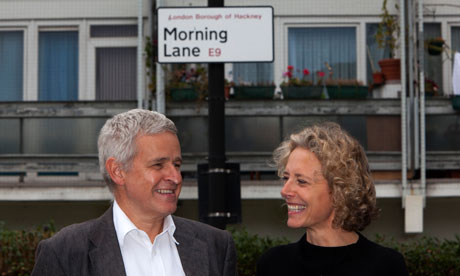
Steve Goodman and Isabelle Trowler, who overhauled the way that social workers dealt with families in Hackney. Photo: Graham Turner for the Guardian
It reads like the Christmas wishlist of every council's children's services department: a 40% reduction in the number of children going into care, staff sick leave halved, being hailed as an example of best practice in an independent government review, and costs cut. All were achieved by Hackney council's children's services, in east London, under the leadership of Steve Goodman and Isabelle Trowler.
- Social Work Reclaimed: Innovative Frameworks for Child and Family Social Work Practice
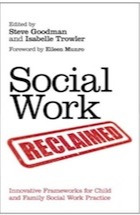
- Buy it from the Guardian bookshop
- Tell us what you think:Star-rate and review this book
The pair – who met in 2005 when Goodman had recently been appointed deputy director of children's services and Trowler was a newly arrived assistant director of children's social care – are credited with transforming children and family social work practices in the borough and influencing government policy. They have written a book about their model of social work and last year set up a social enterprise to help other councils adopt it; they have since left Hackney.
When they arrived in the borough, they found many social workers simply lacked the skills required to do the job, both because of the quality of people entering the profession and inadequate training. The system had become so bound up with tick-box bureaucracy that social workers spent more time filling in forms than working with children and families.
"Children were going into care who, if you did the job properly, wouldn't need to," says Trowler. But what was happening in Hackney reflected what was happening across England, adds Goodman.
Every inquiry into a child death (such as those following the killings of Victoria Climbié and Peter Connelly), has made the system more inflexible and defensive, Goodman and Trowler believe. "Child protectionis about assessing and managing risk. If you are risk-averse you can't do the job," says Goodman. "Instead of working with the family you just take the child away."
Trowler adds: "You can follow the rules, but it won't necessarity help the child … it's conveyor-belt social work."
Like-minded
So the like-minded colleagues set about trying to change things. "At first, we tried to work within the traditional model," explains Goodman, "but we kept realising we were in a cul-de-sac." By 2006, they had realised that "whole-system change" was called for. The result was a new model they called Reclaiming Social Work (RSW), which won the support of the council's chief executive and elected leaders."People thought we were barmy," says Trowler, "to think we could make such huge changes."
But Goodman, 55, and Trowler, 44, were energetic, determined and organised – and complemented each other perfectly.
Goodman grew up on a council estate in Luton with direct experience of social workers coming into the house. He says that seeing social workers work with his own family "formed quite a lot of my values about how we should approach families. Social workers may not feel very powerful but when we knock on someone's door, [to them] we seem very powerful. We need to be aware of that and be respectful. That does not detract in any way from our responsibility to protect children." He started his career 30 years ago in Leicester.
Trowler has worked for various London boroughs and has a master's degree in social work and social policy from the London School of Economics.
"There are no quick fixes," Trowler insists. "RSW is an agenda for change over three to five years" and it needs to be implemented "with military precision" in order to be effective. In budgetary terms, it requires a bit of extra money upfront but costs quickly begin to fall.
A residential placement for a child costs about £2,500 a week, points out Goodman, so with fewer children taken into care under RSW it doesn't take long to recoup the costs of extra training and family support services.
In Hackney, numbers of children in care have declined steadily from 470 in 2004 (not especially high compared with areas of similar deprivation) to about 270 now. Costs are down by 5%.
Few of Hackney's original social workers from 2006 got posts in the new system. Trowler and Goodman introduced verbal reasoning and other pre-interview tests for job applicants and took over the interviewing themselves. At first, they say, it was hard to attract good candidates – the borough had a terrible reputation – but as word got around about what they were doing, that changed.
Staff learn systemic approaches – looking at all the key relationships in a child's life and how they can be improved to create the best outcome for the child.
Another essential element to RSW is the working culture in the organisation. Goodman believes that there must be an environment that is energising and in which thinking and creativity are encouraged, where there is support and good humour and mistakes are accepted and put right as quickly as possible. There also needs to be real understanding for the families. "Culture trumps everything," he says.
So what does RSW mean for families? Goodman recalls a family of six children who had been on social services' lists for years because of neglect. "The children were going to school dirty and smelling of urine, they were underfed and the parents were unco-operative," he says. "Eventually, Hackney got care orders for all six children. The older ones kept running away from foster placements. The new unit worked with the family, and the older children were able to go home."
Trowler cites a mother with learning difficulties. "She was really struggling. She was doing her best and the relationships in the family were warm and loving, but she couldn't manage the practicalities of looking after five children. Usually, these kids would be removed, but we decided instead to invest in family support, practical help – long-term, so the children could stay at home."
An independent review of child protection for the government by LSE professor Eileen Munro earlier this year highlighted RSW as an example of best practice.
Beating a path
As a result, councils are beating a path to the door of the pair's social enterprise, Morning Lane Associates – named after the road in Hackney where the former council employees worked.
Morning Lane Associates already has contracts with 16 councils, including Cambridgeshire, which is about to implement the RSW model. "They have just recruited their first 26 consultant social workers to start work in January," says Goodman, "and they will make it work. They understand the culture change."
Spot the difference
Traditionally, individual social workers have a caseload of perhaps 15 children (depending on the type of case). A team manager oversees often seven or eight social workers – and so probably more than 100 at-risk children, many of whom they will not have met.
In the RSW model, children are allocated to a unit headed by a consultant social worker who is both manager and practitioner. They lead another social worker, a children's practitioner, a clinical specialist and a unit co-ordinator. The co-ordinator undertakes all administration.
Weekly meetings are held to discuss the families before deciding how to move forward. Responsibility for what is to be done is shared by the unit. There is more trust and delegation of responsibility, with a social worker who sees the need to spend, say, £20 on something for a family, having no need to delay for managerial approval, for example.
If a family is difficult, two staff members can visit together. If a staff member is away, there is always another who knows the family's story. During a crisis, several informed people can address it at once.
Subscribe to:
Posts (Atom)
